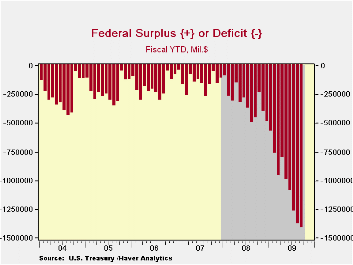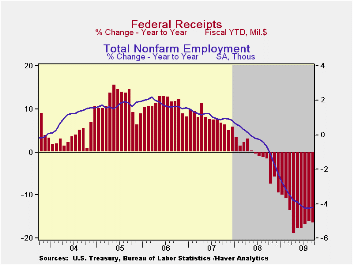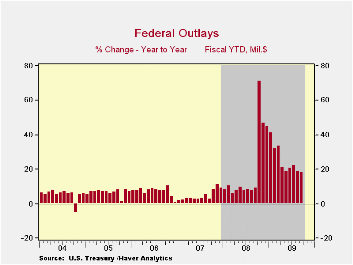 Global| Oct 19 2009
Global| Oct 19 2009U.S. FY '09 Federal Budget Deficit Tops $1.4 Trillion
by:Tom Moeller
|in:Economy in Brief
Summary
The U.S. government ran a budget deficit of $1.417 trillion during Fiscal Year 2009. The figure was by far a record and more than tripled the 2008 deficit of $454.8 billion. While somewhat below the Congressional Budget Office's [...]
 The U.S. government ran a budget deficit of $1.417 trillion
during Fiscal Year 2009. The figure was by far a record and more than
tripled the 2008 deficit of $454.8 billion. While somewhat below the
Congressional Budget Office's recent estimate for a deficit of $1.7
trillion, it nevertheless reached roughly 10% of GDP, the largest since
1945.
The U.S. government ran a budget deficit of $1.417 trillion
during Fiscal Year 2009. The figure was by far a record and more than
tripled the 2008 deficit of $454.8 billion. While somewhat below the
Congressional Budget Office's recent estimate for a deficit of $1.7
trillion, it nevertheless reached roughly 10% of GDP, the largest since
1945.
The recession in the U.S. economy drove the deficit higher last year as revenues lagged sharply and spending increased. Net revenues during FY09 were down 16.6% from FY08. Individual income tax receipts fell 20.1% reflecting higher unemployment while corporate tax receipts fell by more than one-half as profits dried up. Social security contributions fell for the first time since 1995 and estate & gift taxes fell 18.6% after 10.8% growth last fiscal year.
 The wars in Iraq & Afghanistan and the U.S. recession
boosted overall Federal spending by 18.2% versus FY08, double last
year's growth. Defense spending (19% of total outlays) rose 7.1% during
FY09. Though outlays for military personnel rose just 6.1% last year
after 8.9% growth during FY08, Army procurement jumped 15.8% after
36.9% growth during '08. On the home front, growth in Medicare
expenditures (12% of outlays) doubled and "income security" spending
(11% of outlays) jumped by one-quarter with higher unemployment. Social
security payments rose an elevated 10.7% but net interest payments
continued to fall sharply with lower interest rates.
The wars in Iraq & Afghanistan and the U.S. recession
boosted overall Federal spending by 18.2% versus FY08, double last
year's growth. Defense spending (19% of total outlays) rose 7.1% during
FY09. Though outlays for military personnel rose just 6.1% last year
after 8.9% growth during FY08, Army procurement jumped 15.8% after
36.9% growth during '08. On the home front, growth in Medicare
expenditures (12% of outlays) doubled and "income security" spending
(11% of outlays) jumped by one-quarter with higher unemployment. Social
security payments rose an elevated 10.7% but net interest payments
continued to fall sharply with lower interest rates.
Net outlays under the Government's Troubled Asset Relief Program (TARP) started to fall by the end of FY09 but, for the fiscal year as a whole, they amounted to $333.3B. The U.S. Treasury has adopted the view that these TARP expenditures should be counted like any other spending. When the banks repay the Treasury, these funds will be counted as revenue. Accounted for in this way, TARP causes a surge in the budget deficit when the funds are distributed to the banks, but leads to a smaller deficit, or perhaps a surplus, when repayments are received.
 The Government's financial data are available in Haver's USECON
database, with extensive detail available in the specialized GOVFIN.
The Government's financial data are available in Haver's USECON
database, with extensive detail available in the specialized GOVFIN.
The Office of Management & Budget's 2010 Budget can be found here.
The Budget & Economic Outlook: An Update from the Congressional Budget Office can be found here.
| US Government Finance | FY 2009 | FY 2008 | FY 2007 | FY 2006 |
|---|---|---|---|---|
| Budget Balance | -$1,417.1B | -$454.8B | -$161.5B | -$248.197B |
| as a percent of GDP | -10.0% | -3.2% | -1.2% | -1.9% |
| Net Revenues (Y/Y % Change) | -16.6% | -1.7% | 6.7% | 11.8% |
| Individual Income Taxes | -20.1 | -1.5 | 11.5 | 12.6 |
| Corporate Income Taxes | -54.6 | -17.8 | 4.6 | 27.2 |
| Social Insurance Taxes | -1.0 | 3.5 | 3.8 | 5.5 |
| Net Outlays (Y/Y % Change) | 18.2 | 9.1 | 2.8 | 7.4 |
| Nat'l Defense | 7.6 | 11.8 | 4.1 | 6.9 |
| Health | 19.1 | 5.4 | 5.5 | 0.8 |
| Medicare | 10.1 | 4.1 | 13.8 | 10.5 |
| Income Security | 24.9 | 16.8 | 3.5 | 2.3 |
| Social Security | 10.7 | 5.3 | 6.9 | 4.8 |
| Interest | -24.5 | 6.3 | 5.0 | 23.2 |
Tom Moeller
AuthorMore in Author Profile »Prior to joining Haver Analytics in 2000, Mr. Moeller worked as the Economist at Chancellor Capital Management from 1985 to 1999. There, he developed comprehensive economic forecasts and interpreted economic data for equity and fixed income portfolio managers. Also at Chancellor, Mr. Moeller worked as an equity analyst and was responsible for researching and rating companies in the economically sensitive automobile and housing industries for investment in Chancellor’s equity portfolio. Prior to joining Chancellor, Mr. Moeller was an Economist at Citibank from 1979 to 1984. He also analyzed pricing behavior in the metals industry for the Council on Wage and Price Stability in Washington, D.C. In 1999, Mr. Moeller received the award for most accurate forecast from the Forecasters' Club of New York. From 1990 to 1992 he was President of the New York Association for Business Economists. Mr. Moeller earned an M.B.A. in Finance from Fordham University, where he graduated in 1987. He holds a Bachelor of Arts in Economics from George Washington University.
More Economy in Brief
 Global| Feb 05 2026
Global| Feb 05 2026Charts of the Week: Balanced Policy, Resilient Data and AI Narratives
by:Andrew Cates






